Speaking of Voter Access…
Some recent political science on the subject.
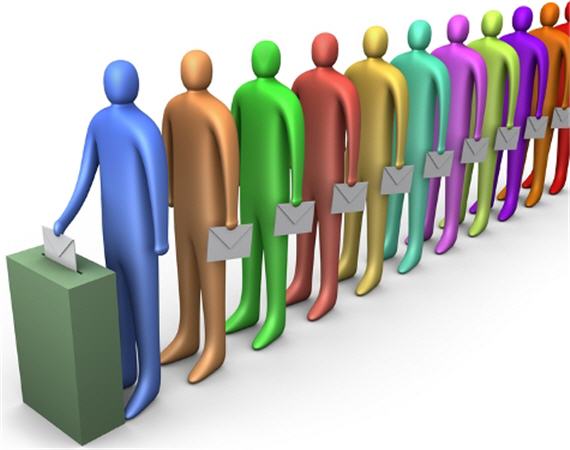 After my post on the lack of electoral fraud in Iowa (and the subsequent discussion), I noticed the following piece at The Monkey Cage: States with higher black turnout are more likely to restrict voting.
After my post on the lack of electoral fraud in Iowa (and the subsequent discussion), I noticed the following piece at The Monkey Cage: States with higher black turnout are more likely to restrict voting.
This led me to the article in Perspectives on Politics by Bentele and O’Brien: “Jim Crow 2.0? Why States Consider and Adopt Voter Access Policies” (you can download the PDF at the link).
First, here is a table that summarizes the types, locations, and partisan control of states that have passed rules to regulate voter access from 2006-2011:
It is worth noting, as a matter of fact, that Republican-controlled states have been the most likely to pass such laws in general, and have exclusively passed the more restrictive versions of said laws. This alone demonstrates a clear partisan element to the policy-making in question. What this means is a different issue. It could simply be that the Republican Party is more sensitive to this topic. After all, the GOP has long been known as an anti-crime party. On the other hand, it is difficult to ignore that the constituencies most likely to be affected by these rules vote Democratic, not Republican. The article offers that this is almost certainly about strategic choices by Republicans politicians to pursue policies that will aid the GOP at the ballot box.
In their paper, Bentele and O’Brien note (1103):
Our analyses identify a very substantial and significant association between the racial composition of a state’s residents or active electorate and both the proposal and passage of voter restriction legislation. This association is robust across multiple modeling approaches and controlling for a wide variety of relevant factors. Further, these findings demonstrate that the emergence and passage of restrictive voter access legislation is unambiguously a highly partisan affair, influenced by the intensity of electoral competition. The fact that in the context of heightened competition Republican control increases while Democratic control reduces, the rate of restrictions passed underlines the highly strategic nature of these efforts.
Emphases mine.
If one goes back and looks at Table 1, one would see that the passage of these laws has been a recent phenomenon. Figure 1 shows the significant uptick in the passage of such laws, as well an upward trend in proposals:
So, what happened in recent years? A likely answer is 2008. As the authors note (1105):
The historic magnitude of Republican losses in the 2008 election are hard to overstate. Minority turnout and Democratic vote margins among minority voters increased substantially in 2008 and this boost is widely viewed as critical to Obama’s election. Republican upsets at the presidential level in the South, (Florida, North Carolina, and Virginia) were particularly painful and alarming to many
Republicans.
As such, one can clearly see a strategic motive in these laws. Along these lines from the article:
a voter-suppression perspective argues that parties have an incentive to suppress their opponents, as opposed to mobilizing new voters, when these new voters bring demands or positions that conflict with their existing base of supporters. In recent decades the Republican Party has both become more conservative on average and more ideologically homogenous.
The analysis continues to note that, as observers of American politics know, the GOP has been increasingly shaped by very conservative primary voters and have been having a great deal of strategic difficulty with both women and Hispanics.
Hence:
In a two party system, when mobilizing supporters is insufficient, demobilizing opponents may provide the only route to victory. The increasing effort put into voter suppression by the GOP in recent years may then be a reflection, in part, of these internal ideological and practical constraints on mobilizing new voters.
Setting aside the normative issues (such as valuing participation), the strategic incentives for Republicans is pretty clear. These laws affect the poor (who are disproportionately minority citizens) and the elderly. Some also target the ability of university students to vote where they go to school. What do most of these voters have in common? They tend to be Democratic constituents. The linkages are hard to deny. I would conclude by noting that the lack of substantial voter fraud undercuts the stated reasons for these rules.
Ultimately, these policies are either a rational strategic political response or they are an irrational response to a non-existent problem. Neither interpretation is especially complementary to the politicians who pursue them. The former explanation, however, appears to be the more accurate one.



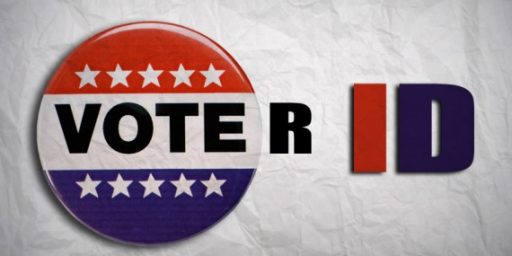
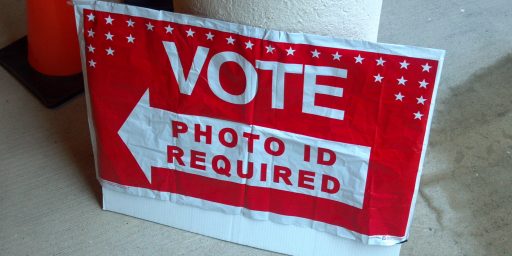
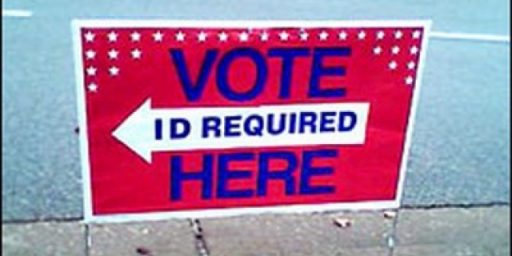
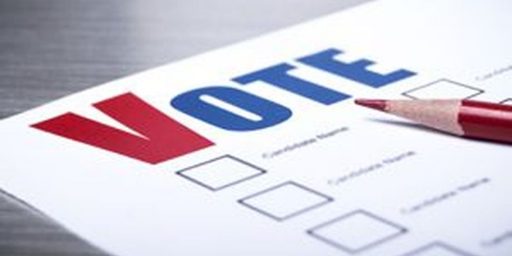
Well, that…or voting twice would work too.
http://www.politico.com/story/2013/12/wyoming-senate-race-2014-liz-cheney-husband-phil-perry-vote-registration-101298.html?hp=l2
They pretty much gave up the pretense when this was proposed. Lack of compelling data aside, you could always argue anti-voter fraud in good faith to an extent. Then when you propose leveling a tax penalty on families that have students vote at their university, you lose the high ground.
It’s especially notable because Republicans are so anti-tax, for them to level extra taxes as punishment for something no one gave a second thought to is just the height of hypocrisy.
Where do you get this stuff, The Department of Making Shit Up?
@edmondo: I am confused. Are you suggesting that the GOP doesn’t typically hew to the law and order line? And, further, are you suggesting that it is insulting or otherwise problematic to associate the party with being anti-crime?
@edmondo: Maybe the last forty years?
@Steven L. Taylor:
Well, in edmondo’s defense (scratches head in disbelief) they are KNOWN as anti-crime. But they are NOT ACTUALLY anti-crime.
@Steven L. Taylor:
No I am suggesting that the Republicans toe a very severe line when it comes to poor people committing crimes. Rich people are entitled to a different set of rules.
Republican President George W. Bush pardoned, commuted or rescinded the convictions of 200 people during his term.[15] Among them are:
Lewis “Scooter” Libby – Assistant to President George W. Bush and Chief of Staff to Dick Cheney was convicted of perjury in connection with the CIA leak scandal involving members of State Department who ‘outed’ CIA agent Valerie Plame. Libby received commutation, not a full pardon.
José Compeán and Ignacio Ramos – Two US Border Patrol agents who wounded drug smuggler Osvaldo Aldrete Dávila and tried to cover up the incident received commutation.[22]
Charles Winters – Posthumous pardon for smuggling three B-17 Flying Fortress heavy bombers to Israel in the late 1940s
Issac Robert Toussie – Convicted of making false statements to the U.S. Department of Housing and Urban Development; pardoned and the pardon revoked one day later
Edwin L. Cox Jr. – Convicted in 1988 for bank fraud
Couple the voter suppression laws with massive gerrymandering of district lines after the 2010 census and you can clearly see that the GOP’s strategy for staying alive as a national party is not to reform their political positions but to control how votes come out.
Yes, but the word “substantial” is key. You have statistics and data for very large populations, and you admirably demonstrate the linkage, or at the very least the correlation, between both minority voting and voter ID laws. In past threads you’ve nearly irrefutably laid out the case that more people are disenfranchised by these laws than the purported potential for actual fraud.
The other side, however, has anecdotes. As Jenos informed us, these are much more important.
False dichotomy. For the GOP establishment, they are a tactic. But a Tea Party voter or politician “knows” that “everybody” agrees with him, so the only way they could have lost is fraud. It’s another case of conservatives believing their own bullshit.
@edmondo:
You forgot George Bush and Dick Cheney admitting to war crimes.
Of course it wasn’t really George’s fault.
Everyone knows he can’t say no to Dick.
Or, it could mean that some of the more publicized laws, such a requiring photo id, are wildly popular among all demographic groups and the Republican Party is just much more in touch with the will of the electorate.
http://www.slate.com/blogs/weigel/2013/12/19/did_17_illegal_voters_in_ohio_steal_the_2012_election.html
Many Republican legislators and political operatives support voter i.d. laws for two purposes: first, to depress Democratic turnout, and second to gin up the base.
Many Democrats/those on the left sometimes inflate the potential negative effect of voter identification and other laws on voter turnout, especially among poor and minority voters.
Further, just as Republicans use the scare of voter id laws as a wedge issue to boost Republican turnout, Democrats use the scare of voter suppression to boost Democratic turnout.
So while Republicans exaggerate the threat of in-person voter fraud, Democrats exaggerate the threat of voter ID laws. In both cases, the claims far outstrip the available evidence.
Jim Crow V 2.0, that simple.
@Jack: There is some truth to what you say, My concern is not so much voter ID as it is the lack of polling places and voting machines in the poorer areas. We have solved that here on the left coast with 100% vote by mail. In addition it’s a lot cheaper.
A small update to the chart: The new Florida governor (Ric Scott) reinstated the restriction preventing felons from voting around 2011. If it missed that it probably understates the severity of situation in that 2012 was an election year and there were plenty of shenanigans including a reduction in the early voting opportunities that resulted in long lines.
My favorite argument whenever this little political gem rears up is to mention the possibility of standardized federally-mandated voting rules and restrictions, complete with free voter ID made available to all citizens. My thought experiment goes thusly: In order to be assured you are truly a citizen, the federal government is the only one who can declare you so. In order to correctly verify you, we will need access to your all private information (gathered in a federal database) and will issue a unique ID for voting and only for voting (not acceptable as ID for anything else by law). In order to accommodate all citizens with disabilities or no reliable transportation, we will need people to go door to door a la the Census (so massive hiring). The cards (and services) will need to be free to avoid the whole poll tax thing so that’s another thing in the Budget to pay for. Since voting is a fundamental right and duty of the American Citizen, there will need to be legal protections put in place to ensure that this dept won’t be held hostage in budget negations so American’s aren’t deprived of Constitutional rights….
I usually don’t get any further than that as the other person starts screaming about big/intrusive government, taxes, national ID/the Number of the Beast or any combination therefore. I don’t think it’s really occurred to conservatives to be very careful what you wish for, you just might get it….The voter restriction/condition you like today is not the only one you will have to deal with tomorrow.
@Jack:
Even if, for the sake of argument, I stipulate to this it is rather important to note that one of these things is not like the other insofar as Republicans have been going beyond rhetoric to initiating policies to that use the power of the state to enforce their vision of this argument. And, further, their POV by definition requires making it harder for people to vote.
@Steven L. Taylor:
Why do you continue to ignore the fact that it’s not just the Republican vision of this argument. The majority of all Americans; Republicans, Democrats, and Independents support laws requiring a photo id? Are you being intentionally dishonest or just blindly partisan?
If you had a passing familiarity with voting trends, you’d know that senior citizens (those 65 and over) reliably vote Republican, yet every argument against voter id always includes the elderly as a group that is at risk for disenfranchisement because they are less likely to have id. Why would Republicans support laws that would disenfranchise some of their most reliable voters?
@Neil Hudelson:
Come on man, everyone knows the plural of anecdote is data.
@Gavrilo:
No one should care if the public supports photo id after the GOP has spent a decade lying about voter fraud.
@Gavrilo:
1. I, too, support voter ID if, and only if, such IDs are free, universal, and easy to obtain.
2. I, too, used to generically support these laws until I thought about their consequences. You see, it is easy to support these laws if you are part of the population unaffected. And, indeed, most of the population is unaffected.
3. However, getting back to the thinking about it part of #2, all I am trying to do is point out what these laws do, and do not actually accomplish. If you can withstand the evidence and stick to your position, that is your right, of course.
@Gavrilo: And, by the way, the majority is sometimes wrong and, the argument has to be made as to why.
This is all that I am doing.
@Steven L. Taylor:
If we are going to have a “your papers please society” which for the most part we already do the government has the responsibility the papers. Yes, free and easy to obtain. I remember in the 50s “your papers please” was used to scare us about tyrannical governments.
@Steven L. Taylor:
1. Most states do issue the photo id for free and it is just as easy to obtain as other forms of government issued photo identification such as a drivers license.
2. Everyone is affected by these laws because everyone must present id where it is required. That some people will have to obtain id before the election does not equal disenfranchisement, nor does it affect the universal application of the law.
3. Again, you ignore the fact that these laws enhance the integrity of the system, which is why they have such strong public support.
@Gavrilo:
1. You are simply incorrect and are speaking from a position of privilege.
To wit, the following type of problems exist:
These can all be substantial hurdles for the poor. See here and the linked study.
2. See #1. These rules do not impact everyone equally.
3. There is no evidence that the integrity of the system is under threat (indeed, the evidence runs the other way). As such, these solutions are not solving a problem that actually exists.
You are not making an argument; you are making assertions. A legitimate argument requires evidence.
@Ron Beasley: Yes, for many years we were taught only Nazis or Commies had such documents. However, the reality is that in the modern era some sort of national ID makes sense–most countries do it, including most democracies.
@Gavrilo:
Please stop talking as if you are aware of the details surrounding this issue. It is quite obvious you are not, and you seem determined to ignore said details when presented to you.
@Steven L. Taylor:
A. Those examples are bull$hit. Those ID-issuing offices are not the only places where one can obtain a photo id for voting purposes. All of those states issue photo id for voting purposes at Driver’s License centers. Voters can obtain a photo id at pretty much any motor vehicle agency any day of the week including Saturday. Those examples you list are only for supplemental offices that will also issue photo id.
B. The institution doesn’t need to be under threat in order to take steps to protect it. Again, you ignore the fact that these laws represent the overwhelming will of the electorate, which is a perfectly valid reason for passing them.
C. You’re joking. I’ve never asserted that voter fraud was a widespread or systemic problem. All I’ve done was point out that it’s real and it happens. I’ve pointed out that the electorate strongly supports these laws. I’ve pointed out that it makes no sense for Republicans to want to disenfranchise elderly voters who vote reliably Republican (a point you have conveniently ignored, btw.) And, I’ve pointed out that the “sky is falling” predictions from the opponents of voter id have been completely unfounded based upon the evidence from all the states like Indiana and Georgia that have had numerous elections requiring voter id without any significant decline in turnout.
@Gavrilo: Pretty much I have to agree with @mantis on this discussion.
You are free to hold your opinion. Enjoy.
Where the hell do live that near a DMV with those kinds of hours?! Or do you mean, some office somewhere in the state (mostly near higher pop. density) has better hours as opposed to the one nearest to someone’s home that’s got crappy times? Perhaps what you mean to say is they can drive to the good one, regardless of where it is and the hassle of traveling there instead of their local one?
So basically, people in rural sparely populated counties are screwed?
@Gavrilo: BTW: you are totally missing the point about the evidence presented above:
Those are the same things. There aren’t separate ID-issuing offices from the “Driver’s License centers”–that’s the point.
@Steven L. Taylor: I agree, it is necessary but it should be easy to get and free. Here in Oregon you have to go to one of the few DMV offices and sometimes wait for hours and then pay $40.00 for a photo ID. In addition where I live if you don’t drive you would be looking at a $40.00 round trip cab fare to the nearest DMV office, it’s no where near a bus stop.
@Gavrilo: BTW, I looked in the county in which I live, which includes the state capitol, and there are no Saturday hours.
@Gavrilo:
It would probably do more for the integrity of the election system in this country if the GOP stopped pushing the fake “voter fraud” stories, and pointed out that all evidence points to it not being a problem. The fact that the GOP is pushing to restrict voting rights based on nothing is a real problem and something that should concern everyone. That is an actual threat to our democracy, unlike “voter fraud”.
Gavvy is a typical right wing troll. When exposed to the facts, he rejects the facts, then makes up some of his own.
nelson mandela must have been trying to suppress the vote too i guess?
isn’t making people register to vote also a blockade?
I think that the issue is more complicated. I only carry my ID with me because I´m required to do that. Managing these cards can be annoying(You can lose it somewhere, that´s requires space in your wallet, etc), so, even if there is easy access to Voter ID that´s can reduce voter turnout.
Considering that if you drive you HAVE to keep your driver license with you, that´s going to create an obvious political advantage to one party. Besides that, most countries that have ID Cards are reforming their ID system to avoid falsification – it´s hard to believe that someone willing to commit voter fraud is going to be stopped by some generic ID card…
@Vast Variety: “The person who votes decides nothing. The person who counts the votes decides everything.”
Somebody famous said that. I can’t remember who. Hmmmmm……..
What some political scientist should do if figure out which voters in which states rarely, if ever, vote, in competitive elections. I suspect that many voters in blue states like Maryland will not vote in a single election that will be decided by percentages of the votes in single digits. I suspect that political scientist that many voters are wasting their time by voting in nothing but noncompetitive elections.
If Democrats are not voting in any competitive elections, it makes more sense that the Democrats would not care who voters and whether non-citizens are voting or that people are voting outside of their locations where they live.
What is amazing is that progressives love to talk about voter suppression but rarely mention how ineffective it has been due to the increased black voter turnout. I suspect progressives will not be happy until no one is voting in a competitive election. Thus the support for no identity and the support for immigration amnesty and open borders.
@superdestroyer:
Wow, that was even more nonsensical than usual.